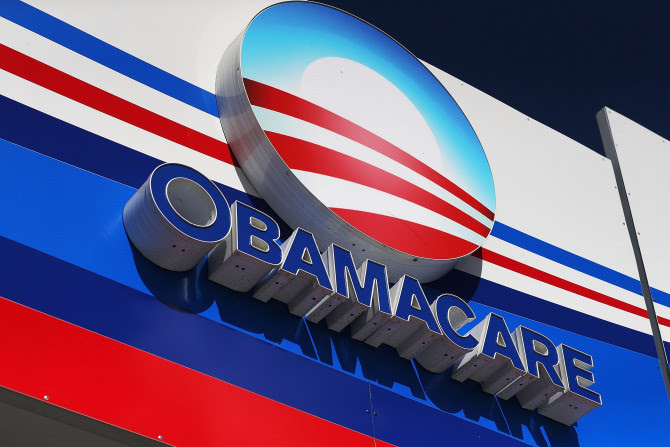By: Stephen A. Crockett Jr.

An Obamacare sign is seen on the UniVista Insurance company office on Dec. 15, 2015, in Miami. Joe Raedle/Getty Images
Obamacare has officially moved into hospice. I think the best thing we can all do now is try to make President Barack Obama’s life work, and arguably the most controversial and effective piece of legislation during his two-term presidency, as comfortable as possible, because the end is near.
The Patient Protection and Affordable Care Act, often referred to by its nickname Obamacare, was a lofty socialist idea that all Americans should be covered with reasonably priced, high-quality health care. Obamacare was born into our lives March 23, 2010. It was the most significant overhaul of the U.S. health care system since Medicare and Medicaid were introduced in 1965. The idea was simple: Eligible consumers received discounts (tax credits) on health insurance plans offered through federal or state health exchanges, and for those who couldn’t afford it, Medicaid assistance programs would pick up the slack.
After a shaky launch, cancerous Republican detractors pointed out that the federal government’s health-exchange website was inefficient, bogged down and slow. But Obamacare would prove to be a godsend for those who had been unable to afford health care or were not eligible for employer-sponsored health coverage. With the website kinks worked out, Republicans shifted their venom to the cost of universal health care, despite the fact that similar Republican ideas also involved government subsidies to offset cost.
One unsubstantiated slogan that emerged during the proposal and unveiling of Obamacare was that it would ruin the country. While no Republican ever expanded on how, exactly, universal health care would ruin the country, the refrain spread. The truth is, Republicans hated Obamacare because Obama created it. They hated it because it worked, and they hated it because it was effective.
Before Obamacare, 47 million people were uninsured, and while it is almost impossible to tell how many of those people now have health care, considering that there are those who have moved over fully to Medicaid—not to mention the federal and various state sites used to enroll members, and that a number of consumers opt out once they receive employee benefits—several sites note that the number of uninsured is at an all-time low.
In January of this year, more than 11.3 million people signed up for Obamacare, and sites are encouraging them to sign up again for coverage beginning January 2017.
While some analysts are predicting an immediate death, others are looking over Obamacare’s assets to see how a dismantled universal health care system might still be useful.
“Through budget reconciliation, it is possible for them to repeal and replace the bill entirely by cutting funding to key parts of the health-reform law, like premium subsidies,” analyst Ana Gupte told NBC News. “They could choke off the blood supply to Obamacare.”
Many believe that Trump’s health care credo of “repeal and replace” is also a lofty goal, considering that there is currently no plan to replace Obamacare—not to mention that there are millions of consumers who are currently enrolled and others looking to enroll before Trump takes office. As with most of the president-elect’s campaign statements, saying it is one thing, but actually doing it is another. Repealing Obamacare won’t be easy. In fact, PwC’s Health Research Institute’s leader, Benjamin Isgur, thinks that an immediate repeal may prove impossible.
“Do you really go through more than 1,000 pages of law—more than 1,000 pages of law that has been turned into multiple thousands of pages of regulations over the last six years—and toss all that out overnight?” he said. “Some of those things have been quite popular with industry, some of it not so popular. Some has been very popular with consumers, some not so popular. Does the Trump administration try to repeal every bit of it? I think that most people think that’s not very realistic.”
Isgur believes that Trump and Congress will tweak the current version of Obamacare to something more palatable to Republicans—basically, a version that looks and feels like something they created while keeping the core of what they fought against intact.
But time is short for Obamacare. The Republican cancer is unrelenting and nonresponsive to treatment. At this point, it’s probably best if we gather around the bed of Obamacare and say our goodbyes. We had six good years, buddy, but in the end, like most who arrive here before their time, you were too good for this world.
Stephen A. Crockett Jr. is a senior editor at The Root. Follow him on Twitter.















